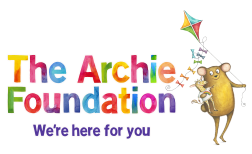GCBN Delivers Vital Service More Than Ever
Grampian Child Bereavement Network (GCBN), part of The Archie Foundation based at Royal Aberdeen Children’s Hospital, provides assistance, information and guidance to help youngsters manage their feelings.
The group, which operates across Aberdeen, Aberdeenshire and Moray, has recorded a 100% increase in requests for help over the past two years.
In 2018, the GCBN’s coordinator Malcolm Stewart said the organisation received 60 referrals – last year that number had increased to 122.
Throughout the pandemic, the group has continued much of its services by adapting them to pandemic restrictions, including direct one-to-one family support from trained volunteer responders which has been taken online, and have featured guest appearances from magicians and included activities like making chocolates together.
Mr Stewart said that with the recent tragic milestone of 100,000 Covid deaths in the UK, the network is proving vital to many children and families.
He said: “We provide support and guidance to help children navigate through the grief process.
“With lockdown, and what everyone has been going through, we’ve been able to continue that direct support either by phone, Zoom or Facetime.
“We have missed the direct interaction with children, we managed in between lockdowns by seeing children in gardens or outwith the home, but now we’re back into the challenge of this current lockdown of finding the best way to support the families that need us.”
Mr Stewart said that the pandemic is making things even worse for children struggling to deal with the death of friends or family.
He added: “What we’re finding with children, especially with younger children, is that every day on the telly they’re hearing about death, which is causing anxiety and fear that their family might catch Covid and die.
“We’ve only had one referral so far when someone has died of Covid, I think the reason for that is there’s so many issues for families of a person that’s died of Covid, they might not be thinking there are still agencies that can assist them.
“What we’re finding in general terms is a lot of children are struggling without being given the opportunity to properly say goodbye.
“People have died in hospital, and children aren’t being able to get in and visit, and we’ve had a good number of referrals where they’ve fit that criteria.
“We’ve had issues with number limits on funerals, where only adult family members of the deceased can go and children can’t attend.
“There aren’t wakes to relieve the pressure of the funeral where people can share the good memories of those that died.
“The word closure is not the right word to use, because a funeral is never closure, but it’s part of the process, and that’s been taken away from these young people.
“And add to that, children aren’t at school. When a child is bereaved, we always suggest a reasonable timescale to get kids back to school, where they’ve got routines, boundaries, and respite away from the grief at home – that also gives parents and carers the chance to grieve without the child present.
“Everything that’s wrapped around Covid causes a lot of confusion for young people grieving.”
The bereavement network recently worked with a group of youngsters from The Warehouse youth café in Elgin, to help the young people with their grief following the death of Elgin High School 13-year-old Philip Polese.
They held a special workshop event for the children that attend the group.
A statement from the youth café group said: “The young people that were able to attend included some of Philip’s closest friends and showed great courage and kindness in remembering Philip as they made special mementos including a tea-light holder, star and fridge magnet and a wrote a special message to Philip on a Christmas star to hang on our tree.
“Despite everyone’s sadness, remembering Philip soon brought laughter and warm friendship together with jokes and smiles as everyone shared their best memories.”
Another of the bereavement network’s projects to help young people is its book-gifting service, which provides free specialist titles to help children talk about their grief, and find the words to remember those who died.
However, it is the most expensive service the organisation delivers, and it is always keen for donations to cover the cost of the books, particularly as there has been a major increase in requests from grieving families over the past six months.
Anyone wishing to help cover the cost of books or help in other ways should click here



